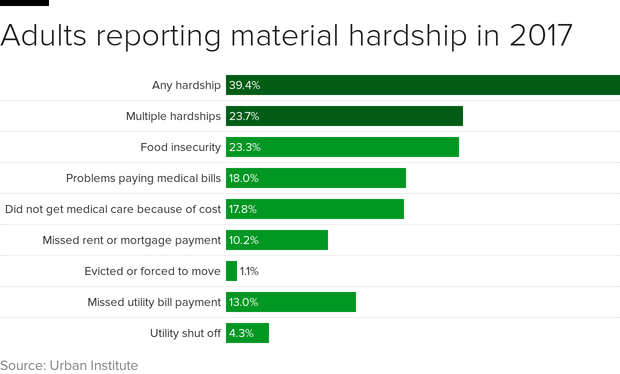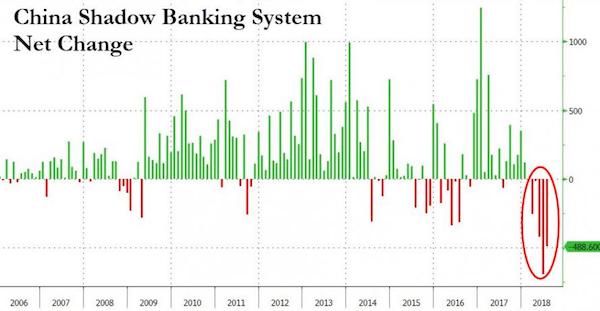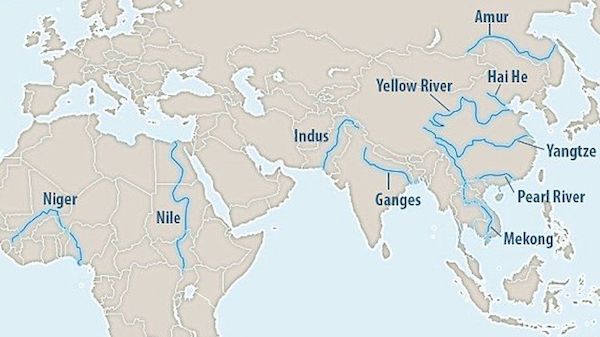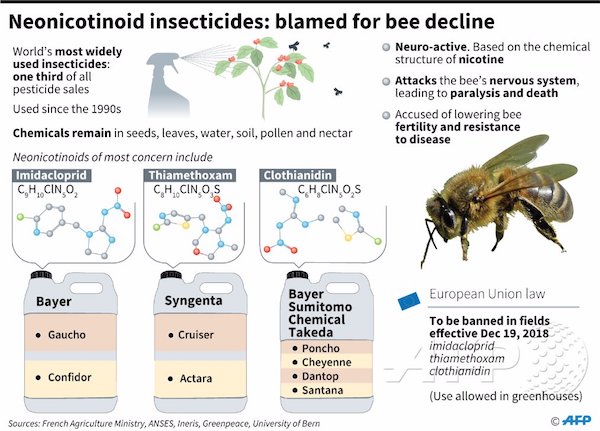
P�a�b�l�o� �P�i�c�a�s�s�o� In “Le Lapin Agile” or harlequin with a glass �1905

Now imagine a shrinking economy thrown in.
• Almost Half Of Americans Can’t Pay For Their Basic Needs (CBS)
Four in 10 Americans are struggling to pay for their basic needs such as groceries or housing, a problem even middle-class households confront, according to a new study from the Urban Institute. Despite the U.S. economy being near full employment, 39.4 percent of adults between 18 and 64 years old said they experienced at least one type of material hardship in 2017, according to the study, which surveyed more than 7,500 adults about whether they had trouble paying for housing, utilities, food or health care. The findings surprised researchers at the Urban Institute, who had expected to find high levels of hardship among poor Americans but hadn’t predicted so many middle-class families would also struggle to meet their basic needs.
That may illustrate that a middle-class income “is no guarantee” of protection from hardship, said Michael Karpman, research associate at the Urban Institute’s health Policy Center and a co-author of the report. Against the backdrop of President Donald Trump’s boasting about low unemployment and strong economic growth, the research adds nuance to the problems facing American families. Middle-class households tend to struggle with paying their health care bills rather than utilities, for instance. Health care costs have outpaced wages and inflation, pushing more Americans into high-deductible plans, which can backfire when serious health problems arise.
“A lot of people are looking at the fact that wages aren’t keeping up with household costs as one reason families are having difficulty making ends meet,” Karpman said. “Even for families with health insurance, they may be facing high deductibles that leave them facing high costs.”


The bias is obvious. How to fight it is not.
• White House Probes Google After Trump Accuses It Of Bias (R.)
U.S. President Donald Trump on Tuesday accused Google’s search engine of promoting negative news articles and hiding “fair media” coverage of him, vowing to address the situation without providing evidence or giving details of action he might take. Trump’s attack against the Alphabet Inc unit follows a string of grievances against technology companies, including social media Twitter Inc and Facebook Inc, which he has accused of silencing conservative voices, and Amazon.com Inc, which he has said is hurting small businesses and benefiting from a favorable deal with the U.S. Postal Services. He frequently berates news outlets for what he perceives as unfair coverage.
Google denied any political bias, saying in a statement that its search engine is “not used to set a political agenda and we don’t bias our results toward any political ideology.” Trump said in several tweets on Tuesday that Google search results for “Trump News” were “rigged” against him because they showed only coverage from outlets like CNN and not conservative publications, suggesting the practice was illegal. “I think Google is really taking advantage of our people,” Trump said on Tuesday in the Oval Office. “Google, and Twitter and Facebook, they are really treading on very, very troubled territory, and they have to be careful. It’s not fair to large portions of the population.”

A pattern emerges. Trump violates 1st amendment when blocking users, but Twitter “retains authority to revoke access”. That cannot stand.
• Trump Unblocks More Twitter Users After US Court Ruling (R.)
U.S. President Donald Trump on Tuesday unblocked some additional Twitter users after a federal judge in May said preventing people from following him violated individuals constitutional rights. U.S. District Judge Naomi Reice Buchwald in Manhattan ruled on May 23 that comments on the president’s account, and those of other government officials, were public forums and that blocking Twitter Inc users for their views violated their right to free speech under the First Amendment of the U.S. Constitution. The Knight First Amendment Institute at Columbia University on August 10 sent the Justice Department a list of 41 accounts that had remained blocked from Trump’s @RealDonaldTrump account. The seven users who filed suit had their accounts unblocked in June.
The 41 blocked users include a film producer, screenwriter, photographer and author who had criticized President Trump or his policies. At least 20 of those individuals said on Twitter that Trump had unblocked them on Tuesday. The 41 users were not a comprehensive list of those blocked by Trump. Rosie O’Donnell, a comedian, said on Twitter late Tuesday that she remained blocked. [..] The ruling has raised novel legal issues. The Internet Association, a trade group that represents Twitter, Facebook Inc, Amazon.com, and Alphabet Inc, filed a brief in the case earlier this month that did not back Trump or the blocked users but urged the court to “limit its decision to the unique facts of this case so that its decision does not reach further than necessary or unintentionally disrupt the modern, innovative Internet.”
[..] The Internet Association said the court “should make clear that this case does not implicate the overwhelming majority of social media accounts throughout the Internet.” “Despite any First Amendment status that this court might find in the ‘interactive spaces’ associated with President Trump’s account, Twitter retains authority to revoke access to both his account and the account of any user seeking to comment on President Trump’s account,” the group said.

Facebook deletes posts from a former UK ambassador.
• Facebook Censorship, Mad Ben Nimmo and the Atlantic Council (Craig Murray)
Facebook has deleted all of my posts from July 2017 to last week because I am, apparently, a Russian Bot. For a while I could not add any new posts either, but we recently found a way around that, at least for now. To those of you tempted to say “So what?”, I would point out that over two thirds of visitors to my website arrive via my posting of the articles to Facebook and Twitter. Social media outlets like this blog, which offer an alternative to MSM propaganda, are hugely at the mercy of these corporate gatekeepers.
Facebook’s plunge into censorship is completely open and admitted, as is the fact it is operated for Facebook by the Atlantic Council – the extreme neo-con group part funded by NATO and whose board includes serial war criminal Henry Kissinger, Former CIA Heads Michael Hayden and Michael Morrell, and George Bush’s chief of Homeland Security Michael Chertoff, among a whole list of horrors.
The staff are worse than the Board. Their lead expert on Russian bot detection is an obsessed nutter named Ben Nimmo, whose fragile grip on reality has been completely broken by his elevation to be the internet’s Witchfinder-General. Nimmo, grandly titled “Senior Fellow for Information Defense at the Atlantic Council’s Digital Forensic Research Lab”, is the go-to man for Establishment rubbishing of citizen journalists, and as with Joseph McCarthy or Matthew Clarke, one day society will sufficiently recover its balance for it to be generally acknowledged that this kind of witch-hunt nonsense was not just an aberration, but a manifestation of the evil it claimed to fight.

“..the generational fiscal catastrophe that looms in the 2020s as 80 million baby-boomers pile onto the social security/medicare wagon.”
• The Greatest Fake Bull Ever (Stockman)
the Wall Street stock indices have vastly out-run the meager gains in the main street economy since the pre-crisis peak; and that at this late stage of the business cycle—merely 10 months from the prior record—there is absolutely no plausible risk/reward equation left. That’s because earnings will plummet in the next recession—by 40% or more if history is any guide. And that’s likely to be conservative in view of the elephant in the casino that Wall Street stubbornly refuses to acknowledge. To wit, back in June 2007, the S&P 500 earnings peaked at $85 per share, but that reflected fully $55 per share of after-tax interest expense. Fast forward to the LTM period ending in December 2017 when earnings per share posted at $110 per share, but reflected only $19 per share of after-tax interest expense.
In other words, more than 100% of the gain over the past 11 years was due to the drastic financial repression of the central banks and its impact on corporate interest expense. Yet the central banks of the world—led belatedly by the Fed—have made an epochal pivot to QT (quantitative tightening) and interest rate normalization, even as the value of the interest expense deduction has been reduced to chump change owing to the new effective tax rate of about 15%. So interest expense is marching back up the hill, and it’s not remotely priced-in—not any more than the next recession or the generational fiscal catastrophe that looms in the 2020s as 80 million baby-boomers pile onto the social security/medicare wagon.

Xi has let the shadows grow to fake the growth, and will have a hard time tackling them now.
• China’s Building-Boom Hits A Wall As Shadow-Banking System Collapses (ZH)
Beijing wants to shore up growth without inundating the economy with cheap credit. But, as WSJ’s Walter Russell Mead pointed out previously, it’s not easy… “Chinese leaders know that their country suffers from massive over-investment in construction and manufacturing, that its real-estate market is a bubble that makes the Dutch tulip frenzy look restrained, that both conventional debt and debt in the shadow-banking system are too large and growing too rapidly. But even as the Communist Party centralizes power and clamps down on dissent, it dithers when it comes to the costly and difficult work of shifting China’s economic development onto a sustainable track. Chinese authorities have tried to tackle some of these problems, but often retreat when reforms start to bite and powerful interests push back.”
To see how hard that will be, The Wall Street Journal’s Nathaniel Taplin takes a look at China’s roads and railways. “China is the 800-pound gorilla of global infrastructure. Its building prowess has permeated popular culture, as in the disaster movie “2012” where China constructs giant ships to help humankind escape rising seas. Recently, however, China’s infrastructure build has all but ground to a halt.” Here’s why… The central government last year started to crack down on unregulated, opaque – so-called ‘shadow-bank’ borrowing – alarmed at its vast scale, and potential for corruption.
For five straight months, the shadow banking system has contracted under this pressure, sucking the malinvestment lifeblood out of economic growth and construction booms as Chinese local governments, which account for the bulk of such investment, set up as so-called local-government financing vehicles (off balance sheet), or LGFVs, and have seen an unprecedented net $19 billion outflow in recent months. As WSJ’s Talpin notes, these days Beijing prefers that local governments borrow on-the-books, through the now legal municipal bond market. The problem is that lower-rated and smaller cities are mostly shut out, even though they do most actual capital spending. As a result, investment has kept slowing even though China’s net muni bond issuance in July was three times higher than it was in March.


“Other Americans just marched around ineffectually, waving banners and shouting antiwar slogans, but not McCain!”
• A Senator Masquerading as a Gas Station (Dmitry Orlov)
John McCain is dead, and many people are celebrating whereas they should be sad. He wasn’t a friend of mankind—he was its enemy, but a really bad one. But with such grossly incompetent enemies—who needs friends? McCain did a great deal to destroy America. He devoted his entire lifetime to American destruction. To start with, he was quite effective as a protester against America’s genocidal war on the people of Vietnam. Other Americans just marched around ineffectually, waving banners and shouting antiwar slogans, but not McCain! His own father had a lot to do with starting that war, but McCain made up for that by destroying 26 American war planes. That’s quite something! If every American flyer crashed as many planes, countless innocent lives would have been saved.
Of course, he could have done even better—and he did try. He almost managed to destroy the US aircraft carrier Forrestal by setting it ablaze. To top off his illustrious military career, he surrendered to the enemy and spent five years in a Vietnamese prison. This made him a hero—in Americans’ eyes only, while the rest of the world saw in him a murderer of Vietnamese children. His “martyrdom” as a POW helped pave his way to a political career, first in Congress, then in the Senate. During his obscenely long career in national politics, McCain did what he could to make American “democracy” look like a complete joke and to hasten America’s collapse. This, by the way, wasn’t a tall order: American “democracy” had long been a cesspool—a playground for lobbyists and political technologists based on a fully gerrymandered system of fake elections. But he did his thing, and is therefore twice the hero.

Fast getting out of hand.
• Brazil Sends Army To Border As Venezuelans Flee Crisis At Home (R.)
Brazil said it was sending armed forces to keep order near the Venezuelan border area, while Peru declared a health emergency, as a regional crisis sparked by thousands of Venezuelans fleeing economic collapse escalated on Tuesday. In Brazil, where residents rioted and attacked Venezuelan immigrants in a border town earlier this month, President Michel Temer signed a decree to deploy the armed forces to the border state of Roraima. He said the move was aimed at keeping order and ensuring the safety of immigrants. Peru, meanwhile, declared a 60-day health emergency in two provinces on its northern border, citing “imminent danger” to health and sanitation.
The decree, published in the government’s official gazette, did not give more details on the risks, but health authorities have previously expressed concerns about the spread of diseases such as measles and malaria from migrants. The exodus of Venezuelans to other South American countries is building toward a “crisis moment” comparable to events involving refugees in the Mediterranean, the United Nations said this week. Temer blamed the socialist Venezuelan government of President Nicolas Maduro for the migration crisis. “The problem of Venezuela is no longer one of internal politics. It is a threat to the harmony of the whole continent,” Temer said in a televised address.

If the US lets Syria rebuild.
• Syria Ready To Take One Million Returning Refugees – Moscow (AFP)
Russia’s defence minister said on Tuesday that war-torn Syria would be ready to accept one million returning refugees, following Moscow-backed reconstruction work. “Since 2015, when towns and villages gradually started to be freed, more than one million people have returned home,” Sergei Shoigu said in comments reported by Russian news agencies. “Now every opportunity has been created for the return of roughly one million (more) refugees,” he told journalists. “Huge infrastructure reconstruction work is ongoing, the rebuilding of transport routes and security points so that Syria can begin accepting refugees.”
Russia, a long-time ally of Syria, launched a military intervention in 2015 to support the embattled regime of President Bashar al-Assad, a move that changed the course of the war. Assad and his allies have since recovered swathes of territory and the government is turning its attention to post-conflict reconstruction, with the aid of Moscow. The war that erupted in 2011, one of the most devastating conflicts since World War II, has displaced more than half of Syria’s population, including more than five million beyond its borders. Most of them fled to neighbouring countries, particularly Turkey, Jordan and Lebanon.

It’ll take a gargantuan effort to stop this.
• Just 10 Rivers Carry 95% Of All Plastic Into The Ocean (BT)
Cheap, durable and multifunctional, plastic is one of humanity’s most successful inventions. From the 1950s to 2015, we’ve produced 8.3 billion metric tons of the stuff. By now, it’s everywhere. It’s also non-biodegradable. And that’s devastating the environment. Only 9% of all plastic waste has been recycled, and another 12% has been incinerated. That means that almost 80%—nearly 6.3 billion tons—has turned into waste with no half-life to speak of: condemned to an eternity as landfill, litter or ocean-clogging junk. Every year, plastic kills around 1 million seabirds, 100,000 sea mammals and inestimable numbers of fish. The volume of plastic trash in the world’s oceans is currently estimated to be around 150 million tons. No less than eight million tons are added to that every year—that’s one truckload every minute.
Between 0.5 and 2.75 million tons come from rivers alone. Large rivers are particularly efficient conveyors of plastic waste to the oceans, especially in countries lacking a well-developed waste management infrastructure. Up to 95% of river-borne plastic comes from just 10 rivers, scientists at the Helmholtz Center for Environmental Research in Leipzig, Germany have found. The scientists analysed data on both microplastic debris (<5mm) such as beads and fibres, as well as microplastic objects (plastic bottles, bags, etc.) from 79 sampling sites on 57 of the world’s largest rivers, singling out the 10 mapped out here as the biggest culprits, due to “mismanagement of plastic waste in their watersheds”.


Nicotine addiction.
• Bees Develop Preference For Pesticides (PA)
Bumblebees acquire a taste for pesticide-laced food that can be compared to nicotine addiction in smokers, say scientists. The more of the nicotine-like chemicals they consume, the more they appear to want, a study has shown. The findings suggest that the risk of potentially harmful pesticide-contaminated nectar entering bee colonies is higher than was previously thought. In a series of studies, a team of British researchers offered bumblebees a choice of two sugar solutions, one of which was laced with neonicotinoid pesticides. They found that over time the bees increasingly preferred feeders containing the pesticide-flavoured sugar.
Dr Richard Gill, from the Department of Life Sciences at Imperial College London, said: “Given a choice, naive bees appear to avoid neonicotinoid-treated food. However, as individual bees increasingly experience the treated food they develop a preference for it. “Interestingly, neonicotinoids target nerve receptors in insects that are similar to receptors targeted by nicotine in mammals. “Our findings that bumblebees acquire a taste for neonicotinoids ticks certain symptoms of addictive behaviour, which is intriguing given the addictive properties of nicotine on humans, although more research is needed to determine this in bees.” Controversial neonicotinoid pesticides are chemically similar to nicotine, the addictive compound in tobacco.









